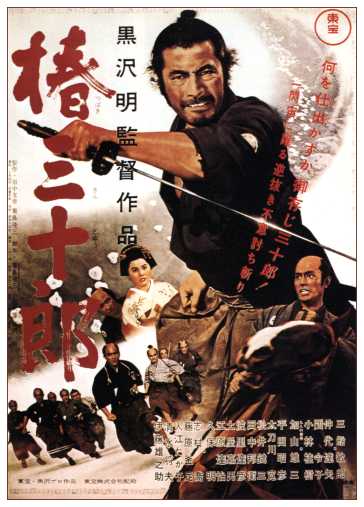|

(1961, directed by Akira Kurosawa)
- inducted 2013 -
"When you spend your life chasing after cinematic thrills, there are certain inevitable regrets.
Invariably, one of the biggest is that you are a prisoner of the particular era you inhabit. It automatically relegates certain
experiences to the realm of scholarship, rather than just going to the movies. There are certain things I am only ever going
to be able to see as filtered through the mists of time. Much like many other contributors and readers here, I would give
my eye teeth to be able to have certain experiences first-hand -- the seismic shifts from silents to talkies and from academy
ratio to widescreen; regular Saturday afternoon matinees complete with cartoons, newsreels and serials; ten cent movie tickets;
being knocked from complacency by the French and Czech new waves, and on and on. My list, probably much like yours, is endless.
This is not to say that there aren’t rewards for making discoveries the way I have. I think I belong to the very last
generation that had to really dig, do the work, read/make ‘zines and haunt libraries and repertory houses to find these
things. We were the last generation that came of age before the Internet made everything instantly available, taking away
some of the thrill of the hunt. It fostered in me a true appreciation for the entire experience -- the reading about, the
tracking down, the viewing of milestone films. To borrow from Warren Oates, those satisfactions are permanent. Still, it doesn’t
quell all of the envy I feel for the people that got to stand in line and buy that ticket in September of 1961 when Yojimbo
came to town.
“Yojimbo was the first film by Akira Kurosawa that I ever saw and it was revelatory for me, even on television.
My old man, the first movie enthusiast I knew, loves the Leone/Eastwood films and by the time I was nearing adolescence we
had already watched those together numerous times. Little did I know that was paving the way for Kurosawa to come along and
kick my ass. The Leone films were already pretty exciting stuff, what with their gunfights, gold and alien landscapes (alien
to a kid in small town Oklahoma, anyway). Discovering Kurosawa, and specifically Yojimbo, though, was something altogether
different and it taught me many a valuable lesson. It was a coming of age. Just about every kid, for a little while at least,
is possessed of the silly and romantic notion that their thing (whatever that thing is) is the first thing, the best thing.
Yojimbo may have been the first time I was made aware that there is nothing new under the sun -- not in a discouraging
way, mind you, but more in the sense that there is a much larger continuum out there of which all art is a part. If it wasn’t
already, my chase was now most definitely on.
“The film itself, you’re probably all acquainted with. Toshiro Mifune’s samurai-with-no-name plays both
ends against the middle in a deft jidaigeki mixture of high noon sagebrush, film noir rough stuff, feudal Japanese class issues
and swordplay. The result is a thrilling and cohesive whole that people are still ripping off/paying homage to today. The
one thing that none of the predecessors or imitators have, though, is Mifune.
“I had never seen anything like him. I still haven’t. The human face has fifty-odd muscles in it. That’s
approximately 3 X 10^64 possible facial expressions. Mifune is the only person on Earth whom I believe was capable of making
them all. The story is riveting, but it's his fierceness and vitality that make this still fresh and exciting fifty years
down the road. For all the windswept streets, mulberry fields and lonely roads, the most important topography is that face.
That’s where the whole story plays out. It's what I couldn’t take my eyes off of as a youngster and it's the thing
that is going to keep it a powerhouse fifty years from now. All that political shrewdness, earthy humor, cynicism and almost
surreal violence bound up in one man, still so raw and intense, so entertaining
“I thank the heavens every day for what technology affords us now as cinephiles. I marvel at the fact that (if it were
my only option) I can watch Yojimbo on my telephone. We are alive in such an incredible time that we have access to
film and the ramblings of other film lovers in ways never imagined half a century ago. But oh, what I would have given to
be in the audience in 1961. It must have been like a bomb going off."
~ Cole Roulain
Principal cast: Toshiro Mifune, Tatsuya Nakadai, Yoko Tsukasa, Isuzu Yamada, Daisuke Kato, Seizaburo Kawazu,
Takashi Shimura
Screenplay by Akira Kurosawa and Ryuzo Kikushima
Story by Akira Kurosawa
Produced by Akira Kurosawa
Executive producer: Ryuzo Kikushima and Tomoyuki Tanaka
Director of photography: Kazuo Miyagawa
Production design by Yoshiro Muraki
Costume design by Yoshiro Muraki
Film editing by Akira Kurosawa
Original music by Masaru Sato
Hair stylist: Yoshiko Matsumoto and Junjiro Yamada
Sound by Choshichiro Mikami and Hisashi Shimonaga (sound recordists), Masanobu Miyazaki (sound mixer), Ichiro Minawa (sound
effects editor), Zen Shida (assistant sound)
Choreography by Hiroshi Kanesu
Swordplay instructor Yoshio Sugino
Swordplay technique Ryu Kuze
Japan
Duration: 110 minutes
Language: Japanese
Filmed in black and white
Sound mix: Perspecta Stereo (Westrex Recording System)
Aspect ratio: 2.35:1 (Tohoscope)
Produced by Toho Company and Kurosawa Production Co.
Released in USA by Seneca International
Premiered in Japan on 25 April 1961
USA release date: 13 September 1961
Awards and honors:
- The Muriel Awards, 2011: 50th Anniversary Award (won)
- Selected as one of Roger Ebert’s “Great Movies,” 10 April 2005
- Venice Film Festival, 1961: Volpi Cup for Best Actor, Toshiro Mifune (won)
- Academy Awards (USA), 1962: Best Costume Design, Black and White (nominated)
- Venice Film Festival, 1961: Golden Lion (nominated)
|

